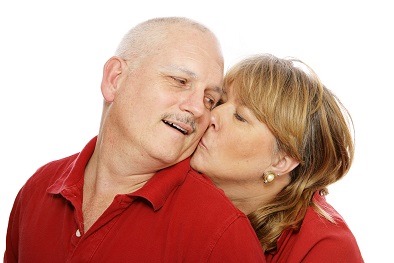Published: October 9, 2006
Due to fluctuating hormones characterized by menopause, some women notice changes in libido (a higher or lower than usual sex drive).
However, it is a common myth that all women experience a decreased sex drive and decline in sexual activity at menopause. The results of gynecological and psychological studies report 50 percent of menopausal women report no decline in sexual desire.
Less than 20 percent report any significant decline in sexual interest.2 The numbers are slightly different for surgically induced menopausal women. In a survey of more than 600 hysterectomy patients by the HERS Foundation (Hysterectomy Educational Resources and Services), nearly 75 percent cited a loss of sexual desire they did not anticipate, while more than half experienced loss of sensuality and sexuality.
The relationship of hormones and libido is a heated debate. According to the North American Menopause Society3, there is currently no evidence of estrogen therapy effecting libido (although improvements of sexual function have been reported related to the restoration of vaginal lubrication). However, most researchers believe that the hormones estrogen, testosterone, and DHEA do play a role in sexual desire and responsiveness. Androgens are the major class of hormones that dictate libido. Currently, there are no FDA approved androgen products available to treat sexual dysfunction in women. Although they are deeply connected, sexual dysfunction and sexual desire are different matters. We can have one without the other. Let us not overlook the loss in libido (for some women) can be due to physical changes. For example, a painful sexual experience due to vaginal dryness or a uterus or bladder that is dropping (prolapse) certainly may decline one’s desire significantly.
Also, our sexual characters (how we perceive ourselves sexually) can be diminished by several other physical factors including the ability to reach orgasm.
Libido
Where are the roots of sexual desire? What or who manifests libido? What psychological and emotional factors influence libido? The answers are relative to your personal perception of sexual desire. For some, a “strong” sexual desire necessitates a hot, physical lustful yearning. For others, it suggests an intense, but subdued emotional desire. Individual sexuality is also dictated by frequency of sexual activity.
People and their psychosomatic variations in opinions on libido are all different.
We must not forget the influence our cultural norm has on our interpretation of sexual desire. The frequency of sexual participation is a personal choice and there is no “normal” standard that we follow. While some feel the urge for sexual activity is necessary a few times a week, others feel once a month is sufficient.
So, saying you have a low libido might mean something different for every woman.
Libido is dictated by many factors including personal beliefs and values, motivation, expectations, partner, stress, lifetime sexual experiences, genetics, self-esteem, body-image, childhood upbringing, etc.
If your libido is affected by physical conditions (vaginal tissue changes, sleep disorders, hot flashes, hormone changes, fatigue), it is important to assess these with a doctor or sex therapist.
Your sexual desire may be affected by a medical condition or a drug that adversely affects sexual function (i.e., antidepressants).
Non-medical treatments recommended by the North American Menopause Society including:
- Allow more time for manual or oral stimulation
- Experiment with erotic materials, sexual fantasies, vibrators, dildos
- Try a sensual massage or warm bath
- Change the sexual routine, such as the location or time of day
- Use vaginal lubricants or moisturizers (water-based)**
- Explore noncoital sexual activity, such as oral sex or masturbation
- Increase communication about sexual and other concerns between the woman and her partner
- Seek counseling and/or sex therapy if needed
There are many other non-medical ways that have helped women improve sexual desire including herbs, regular exercise and a healthy lifestyle. Communicating with your partner is one of the first steps you should take when experiencing a change in libido. Talking about your libido issues with your healthcare provider is a good place to start if you are experiencing a change. There are also the Red Hot Mamas Menopause Forums, where discussing sexual concerns is appropriate.
Solutions to a Struggling Sex Life at Menopause
Don’t be caught off-guard. Familiarize yourself with the physical and psychological sexual changes that can occur during menopause.
Sex can remain pleasurable at any age… knowing what to expect may help you understand the changes and learn how to cope with them.
References and resources for post:
1 Seibel, M. M., Men, women, and testosterone: why did the FDA fail Intrinsa? Sexuality, Reproduction & Menopause, Elsevier Inc., New York, 2005; 3:1-2. www.srmjournal.org.
2 Northrup, C., 1998, Women’s Bodies, Women’s Wisdom, pp.554-557
3 North American Menopause Society, 2005, Menopause Practice, A Clinician’s Guide, Section J.
 Red Hot Mamas In Charge of Change.
Red Hot Mamas In Charge of Change.







